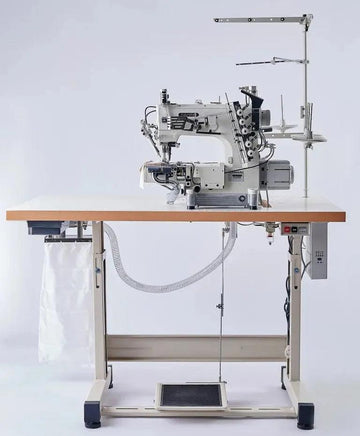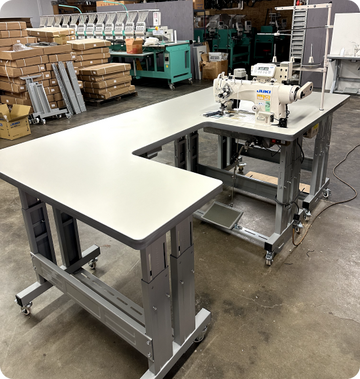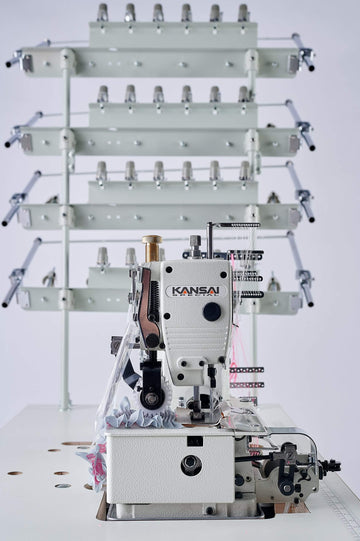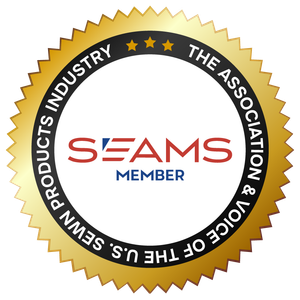Manufacturers are constantly looking for sewing equipment that could optimize mass production through high quality and large output. Industrial sewing machine brands use advanced technologies to meet those growing market needs. They offer universal and specialized sewing machines for heavy duty operation. Depending on the initial functionality, they come with specific cutters, spreaders, and even needles to complete various sewing tasks.
Using the right sewing machine in industrial settings is crucial for meeting project needs.
Juki/Jin, Pegasus, and Kansai Special are the most prominent names in the production of sewing equipment for industrial needs. When checking their product offering, consider the type of fabric, stitching pattern, and production volume you have to deal with.
What Defines a Good Industrial Sewing Machine Brand?
Industrial sewing machines are designed for industrial use, running several hours a day. They should integrate certain features for smooth performance. Different brands of industrial sewing machines bring something a little different to the table. The key factors that determine a good brand include:
-
Powerful motors and durable materials like aluminum and cast iron that withstand continuous use;
-
Precision and higher stitch quality thanks to carefully calibrated components, leading to high efficiency;
-
Cutting-edge technology like track feeding and gyroscopic thread stabilization that optimizes the production process;
-
Responsive customer support handling individual inquiries and solving technical issues over the phone or directly in the office;
-
Industrial machine cost may vary depending on the design and sewing tasks it works on.
Considering your industrial needs, you need to find a machine that fits your style, your budget, and the kind of fabric you work on. Choose a few reliable brands and then compare their machines based on your project needs.
Types of Industrial Sewing Machines
Industrial sewing machines have a lot of common features, but their initial use is different. The main types of industrial machines on today’s market include:
-
Straight stitch sewing machines feature a single needle and a straightforward mechanism that creates basic stitches.
-
Lockstitch sewing machines create lockstitches by making upper and lower threads interlock or twist together.
-
Overlock machines or sergers make overlock stitches, with thread loopers being sewn over the edge of the fabrics.
-
Chainstitch sewing machines form a chain of stitches by sending the thread down the fabric and interlooping it with itself.
-
Coverstitch machines create parallel rows of straight stitches on one side and overlock or serger stitches on the other.
-
Heavy-duty machines are designed for heavy duty operations, being able to handle light- and heavyweight fabrics and produce quality stitches at high speed.
Top industrial sewing machine brands produce sewing equipment with certain specifications. They usually have models designed for specific sewing tasks in industrial settings. Most of them focus on the sewing machines in garment production.
Top Industrial Sewing Machine Brands
When navigating today’s market, you may want to check the best brands of industrial sewing machines. Below, learn what sets them apart from competitors.
Juki
Juki is a Japanese manufacturer of industrial and household sewing machines. It specializes in non-apparel industrial sewing machines that create high-quality seams on large and heavyweight materials. Juki integrates powerful motors that enable consistent stitches that last.
Pros:
-
High speed, enabling up to 5,000 stitches per minute;
-
Heavy duty frames and quality metal parts, good for continuous use on heavy fabrics;
-
Consistent straight stitches, even on heavy fabrics;
-
Strong automation features.
Cons:
-
Limited stitch variety in some models;
-
High maintenance needs.
Pegasus
Pegasus is a Japanese industrial sewing machine manufacturer with extensive experience. It mainly specializes in two types of commercial sewing equipment, like overlockers and interlocks. Pegasus is known for producing universal machines with various stitching options and automated features, reducing some sewing tasks to minutes.
Pros:
-
High speed offered by every model, increasing production capabilities;
-
Strong build, with parts designed to endure long hours of use;
-
Oil seals and oil barrier mechanisms, reducing oil stains on fabrics;
-
Servo motor integration, reducing heat and vibration.
Cons:
-
Limited use for overlock and interlock stitching;
-
Large designs that can’t fit every space.
Kansai Special
Kansai Special is a Japanese manufacturer of multi-needle chain stitch sewing machines and other textile machinery. It focuses mainly on long stitching, while connecting line tapes, lap seaming, and cuffing suits. Kansai has built a good reputation for high quality and affordability compared to the closest competitors.
Pros:
-
Build quality based on quality needle-bar drives, diamond-like carbon coatings, and strong frames;
-
Specialized feeding and pulling mechanisms to create uniform stitches;
-
Wide range of sewing machines for various industrial needs;
-
Automatic functions to reduce production time.
Cons:
-
Large size and heavy weight of machine constructions;
-
Sewing machines are intended for limited tasks.
Comparison of the Best Brands
When checking the best industrial sewing machine brands, you should pay attention to their specifications. Consider the brand’s sewing machine features, prices, and reliability to make the right choice in the end.
|
|
Juki |
Pegasus |
Kansai Special |
|
Features |
Strong straight-stitch machines (DDL, DU, DNU series), powerful motors, good feeding systems, high speed up to 5,500 SPM, robust frames, and good global parts support. |
Overlock, coverstitch, multi-thread finishing machines, quality edging, and seam finishing. Some models offer 4-6 threads overlock at high speed. |
Main focus on long stitching, supporting double-chain, coverstitch, multi-needle, cylinder-bed, or flatbed sewing techniques. Most models feature rear puller feed, thread cutters, and adjustable gauges. |
|
Price range |
Between $900 and $100,000, depending on the industrial model specifications |
Between $1,300 and $10,000, depending on the industrial model specifications |
Between $1,700 and $7,000, depending on the industrial model specifications |
|
Reliability |
Juki has a good reputation due to long lifespan, low downtime, quality build, and organized service networks. Their machines are used heavily in garment production. |
Good durability of overlock and coverstitch sewing machines, less robust when pushed beyond stitching limits, and strong finishes. |
High reliability, especially in tasks for which they are built (e.g., heavy waistbands, elastic, chain stitch). Well-engineered for continuous use; parts and mechanisms like pullers are designed for durability. However cost of parts or service can be higher due to specialization. |
If you don’t know which brand of sewing machines to choose, you should check its product offering and then compare it with your industrial needs. If you work on heavyweight fabrics, you may consider buying one of Juki’s machines. If you need to create stitches on stretchy fabrics, you can benefit from buying a coverstitch machine from Pegasus. If you produce many items with waistbands, elastics, and tape, you can get specialized machines from Kansai Special. All brands offer good warranty terms, ensuring a positive customer experience.
Read Also: The Best Table for Juki Sewing Machines: Why Prizzi Stands Out
How to Choose the Right Brand for Your Needs
Finding the best industrial sewing machine brand on today’s market takes time and effort. But you can make the right choice knowing what to look at. There are machines for every type of stitch, pattern, and skill level. You need to find one that suits your needs. Here is how to choose the right brand for your needs:
-
Size: Look for a machine of the appropriate size to fit your industrial space. Also, consider the size of the product to be sewn. You may need a table to position a machine. Or you can find a machine that comes with a special table.
-
Fabrics: Check what type of fabric you are planning to sew. Find a machine that handles lightweight or heavyweight fabrics, depending on your project needs.
-
Budget: Stick to your budget when choosing a brand and a machine. The prices may vary depending on design and functionality.
-
Production volume: Consider your project volume and deadline. You need to choose a machine that would be powerful enough to meet your production needs in terms of output within certain timeframes.
Some brands offer advanced machines with intricate computerized features. Others focus on more basic sewing machines to complete essential sewing tasks. Find the right balance between the initial use purpose, quality, and price.
Conclusion
Juki/Jin, Pegasus, and Kansai Special offer the best brand industrial sewing machines on the market. You need to compare the available models to choose one that will suit your production line. Your choice should be based on build quality, speed, and specialization of these impressive machines. Your production volume and available budget should also be taken into consideration.
Don’t chase the most popular brand or the most expensive sewing machine. While brand reputation matters a lot, you should focus on finding the sewing machine with the right set of features for your industrial needs.










